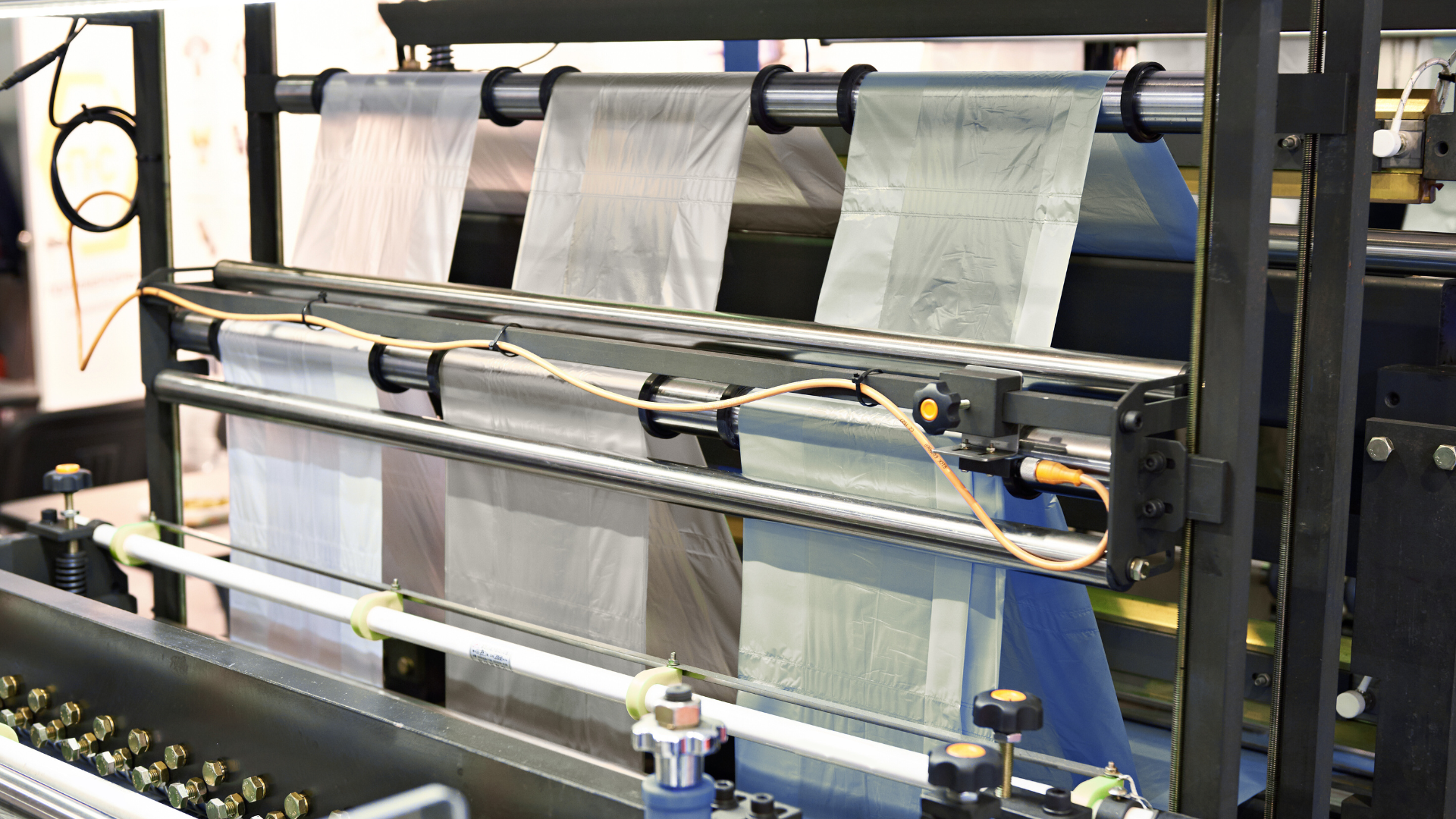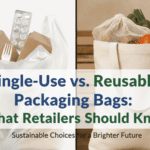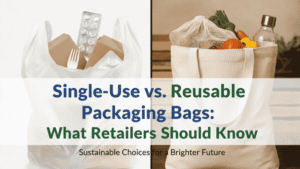
The Ultimate Guide to Polythene Bags for Food Packaging

Food businesses require quality “containers” to preserve goods, keep them hygienic, and attractive. Polythene bags have been an important tool for them to fulfil these objectives. After all, they are inexpensive, versatile, and convenient.
In this guide, we will walk you through the ins and outs of plastic bags, including their benefits, their types, and how to choose the right ones. Let’s dive in.
What Are Polythene Bags?
Polythene bags are plastic bags that are composed of polyethylene material. It is a light, tough, and pliable material.
It is commonly used for food packaging as it preserves food by maintaining its safety and freshness. Polythene bags are available in numerous shapes, sizes, and styles, and thus suit all types of food businesses, including bakeries, grocery stores, and so on. Some of the common poly bags are HDPE, LDPE, LLDPE, and MDPE according to their density.
These bags are convenient and protect food from air, water, and germs. They are also cost-effective and thus save money for small businesses. Besides, you can customize polythene bags to ensure that your brand is unique.
Why Use Polythene Bags for Food Packaging?
Keep Food Fresh:
Polythene bags are used as moisture barrier bags. They are resistant to water and air, which may contaminate food. This contributes to the longer shelf life of products such as fruits, vegetables, and baked goods.
Safe for Food: Food-grade polythene is specifically produced to be safe when storing food. It does not emit toxic substances and, therefore, your customers can rely on your products.
Strong and Durable: Durable food packaging is significant to ensure that food is safe during transportation or storage. Polythene bags are tear-resistant, which implies that they do not tear easily.
Customizable: Custom printed polythene bags allow you to add your company logo, brand colors, or product information. This will make your packaging look professional and will remind the customers about your brand.
Economical: Polythene bags are cost-effective. They are a good alternative to those companies that are not willing to spend a lot of money but would like quality packaging.
Eco-Friendly Solutions: There are biodegradable polythene bags or compostable polythene bags. These decompose naturally, and this is more environmentally friendly.
Polythene Bags Types for Food Packing
Clear Polythene Bags
The polythene bags are clear, and therefore the customers can see the food in them. They are terrific at presenting fresh fruits, snacks, or baked goods. As an example, a bakery can display colorful cupcakes in clear polythene bags. Such bags are also polythene of food grade, therefore keeping your products safe.
Biodegradable Polythene Bags
Polythene bags that are biodegradable are environmentally friendly. They decompose more quickly than the normal plastic bags, which minimizes waste. These bags are widely used by the food businesses that are concerned about the environment. As an illustration, a grocery store can employ biodegradable polythene bags to package fruits and vegetables.
Compostable Polythene Bags
Compostable polythene bags are a step further. They dissolve into natural products that are beneficial to the soil.
Moisture Barrier Bags
Moisture barrier bags are meant to prevent water and humidity. They are ideal for the packaging of foods such as spices, nuts, or even dried fruits. They help in increasing the shelf life and make food crunchy and fresh.
Tear-Resistant
Packaging that is tear-resistant is an added strength. These bags will not rip or tear, even when they are loaded with heavy goods such as frozen foods or bulk grains.
Advantages of Polythene Bags for Food Businesses
There are numerous merits associated with the use of poly bags when storing food.
Preserves Food Freshness:
Polythene bags ensure that food is not contaminated by dirt, germs, and moisture. This will guarantee your customers fresh, quality products.
Portable:
These bags are easy to fill, close, and store. Others are even equipped with zip-lock options or sticky strips to fasten.
Lightweight:
Polythene bags are light and therefore they do not cause additional weight to your products. This will save money in shipping expenses.
Multipurpose:
Polythene bags can be used to store almost all types of foods, such as bread, meat, or snacks. They are available in different sizes to suit your needs.
Branding:
You can make your products look attractive by using custom-printed polythene bags. Bold designs and bright colors attract the attention of customers.
Eco-Friendly Alternatives:
You can use biodegradable or compostable polythene bags to demonstrate to your customers that you are concerned about the planet. This will bring in environmentally friendly customers.
How to Choose the Right Polythene Bags for Food Packaging
Know Your Product:
Consider what you are packaging. Fruits and vegetables may require transparent polythene bags to display the food. Frozen goods can go well with tear-resistant wrappings.
Look for Food Safety:
It is always important to use food-grade polythene bags. These undergo testing to make sure that they are food contact safe.
Consider Branding:
Custom printed polythene bags are the way to go if you want to advertise your business. They make a fantastic method of exposing your brands to thousands of eyes wherever they are taken by a customer.
Think About the Environment:
You can choose biodegradable polythene bags or compostable polythene bags. These are more sustainable for the planet.
Match Size to Product:
Be sure that the bag size suits your food products.
Check Durability:
Tear-resistant packaging is ideal for heavier or sharper goods, such as frozen meat. Normal bags are sufficient for light products such as cookies.
Test Moisture Requirement:
When your food must remain dry, such as spices or snacks, use moisture barrier bags to keep out moisture.
The Right Ways to Use Poly Bags for Food
To make the most of the use of poly bags to pack food, do the following:
Storage:
To retain the quality of polythene bags, keep them stored in a cool and dry environment. The material is prone to heat or moisture.
Seal Tightly:
Bags should be closed with the help of heat sealers, zip-locks, or tape. This maintains the integrity of food and avoids spillages.
Label Clearly:
When it comes to clear polythene bags, you should add labels that contain the product information, such as ingredients or expiration dates.
Final Thoughts
Food businesses rely on poly bags for the efficient packaging and storing of their items. These bags are cheap, versatile, and help preserve food. Consider the type of food, branding objectives, and the importance of the environment while choosing polythene bags for food your business.
If you are looking for high-quality food poly bags, get in touch with us at Connover Packaging. We offer high-quality poly bags tailored to your requirements. Contact us now!
Share:
Get A Quick Quote
Social Media
Most Popular


Essential Plastic Bags Used in Healthcare Packaging and Their Uses


What Retailers Should Know About Plastic Shopping Bag Myths
Categories
Tags
Related Posts

How to Avoid the Top Mistakes When Using Plastic Evidence Bags
Proper evidence handling is the backbone of any successful investigation. From crime scenes to courtrooms, the integrity of physical evidence determines whether facts hold up

Essential Plastic Bags Used in Healthcare Packaging and Their Uses
In modern healthcare environments, safe and reliable packaging plays a critical role in infection control, organization, and operational efficiency. From hospitals and clinics to laboratories

Single-Use vs. Reusable Packaging Bags: What Retailers Should Know
Packaging plays a critical role in retail operations, customer experience, and brand perception. One of the most important decisions retailers face today is choosing between
